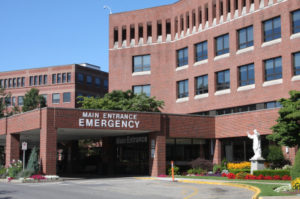Uninsured ED and Inpatient Visits Down Since ACA
Uninsured hospital admissions and emergency department visits are down since passage of the Affordable Care Act.
And Medicaid-covered admissions and ER visits are up, according to a new analysis.
 The report, published on the JAMA Network Open, found that ER visits by uninsured patients fell from 16 percent to eight percent between 2006 and 2016, with most of this decline after 2014, while uninsured discharges fell from six percent to four percent.
The report, published on the JAMA Network Open, found that ER visits by uninsured patients fell from 16 percent to eight percent between 2006 and 2016, with most of this decline after 2014, while uninsured discharges fell from six percent to four percent.
The rate of uninsured ER visits declined, moreover, at a time when overall ER visits continued to rise.
While the Affordable Care Act is likely the cause of most of these changes, other contributing factors include the emergence of urgent care facilities, telemedicine, and free-standing ERs as well as new payment models and rules.
The study’s findings are especially good news for Pennsylvania safety-net hospitals because they care for so many more low-income patients than other hospitals and have benefited from the Affordable Care Act’s expansion of access to insurance, whether through Medicaid expansion or the private health insurance market.
Learn more in the JAMA Network Open article “US Emergency Department Visits and Hospital Discharges Among Uninsured Patients Before and After Implementation of the Affordable Care Act.”
 Included in this month’s edition are articles about:
Included in this month’s edition are articles about: According to a new study, safety-net, academic, and rural hospitals have enjoyed improved performance under the program since Medicare began organizing hospitals into peer groups based on the proportion of low-income patients they serve rather than simply comparing individual hospital performance to that of all other hospitals.
According to a new study, safety-net, academic, and rural hospitals have enjoyed improved performance under the program since Medicare began organizing hospitals into peer groups based on the proportion of low-income patients they serve rather than simply comparing individual hospital performance to that of all other hospitals. In a message sent to every member of the U.S. House of Representatives from Pennsylvania, SNAP asked members to sign onto a letter to House Speaker Nancy Pelosi asking her to delay Affordable Care Act-mandated cuts in Medicaid disproportionate share payments (Medicaid DSH) that are scheduled to take effect in October of this year.
In a message sent to every member of the U.S. House of Representatives from Pennsylvania, SNAP asked members to sign onto a letter to House Speaker Nancy Pelosi asking her to delay Affordable Care Act-mandated cuts in Medicaid disproportionate share payments (Medicaid DSH) that are scheduled to take effect in October of this year. Last week the Medicaid and CHIP Payment and Access Commission voted overwhelmingly to change how hospitals calculate their Medicaid shortfall: the difference between what they spend caring for their Medicaid patients and what Medicaid pays them for that care. Under MACPAC’s proposal, hospitals would need to deduct from their shortfall total all third-party payments they receive for the care they provide to their Medicaid patients.
Last week the Medicaid and CHIP Payment and Access Commission voted overwhelmingly to change how hospitals calculate their Medicaid shortfall: the difference between what they spend caring for their Medicaid patients and what Medicaid pays them for that care. Under MACPAC’s proposal, hospitals would need to deduct from their shortfall total all third-party payments they receive for the care they provide to their Medicaid patients. According to Speaker Pelosi,
According to Speaker Pelosi,